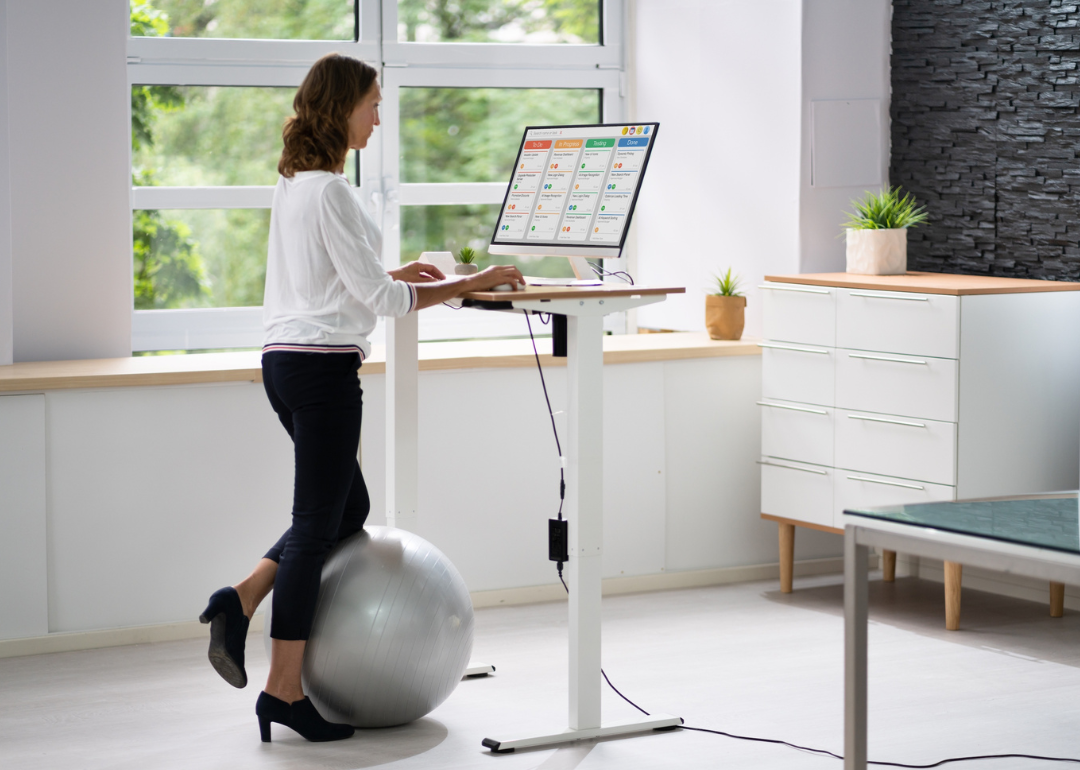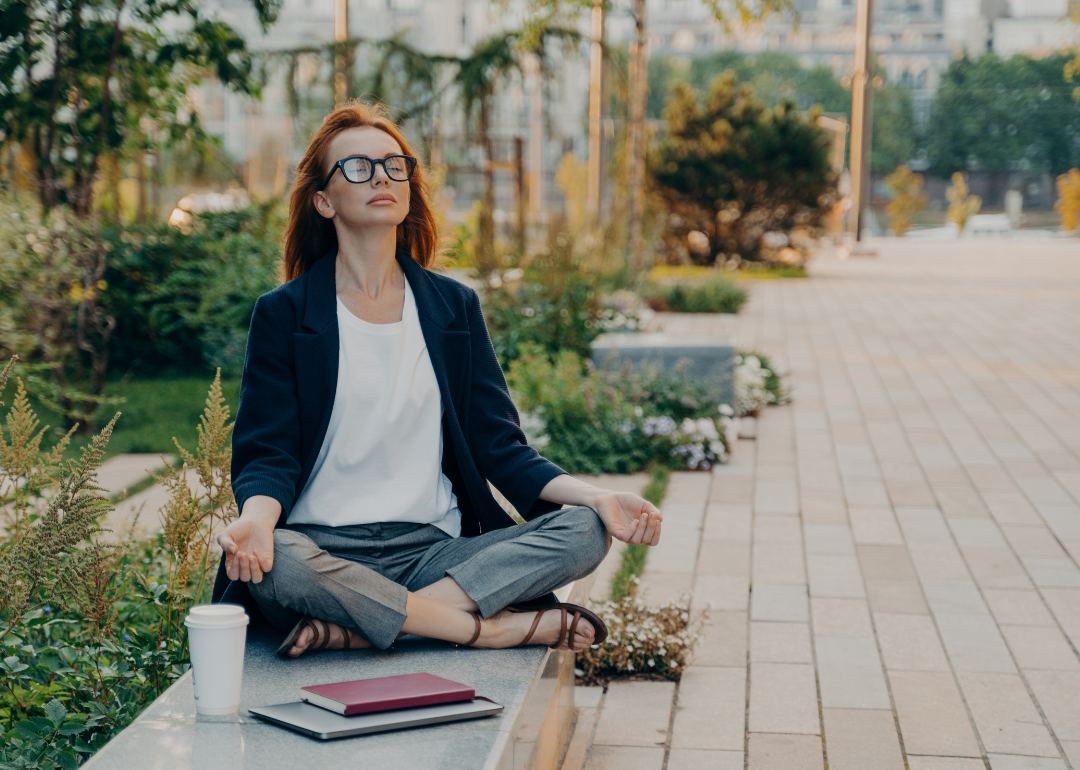
From standing desks to mini-walks: 7 easy ways to make healthy improvements to your daily routine
This story originally appeared on NNOXX and was produced and distributed in partnership with Stacker Studio.
From standing desks to mini-walks: 7 easy ways to make healthy improvements to your daily routine
The proliferation of remote jobs shifted tens of thousands of workers away from offices—but not from their desks. Sedentary habits and inadequate posture in front of a computer—usually the result of poor back support—are common culprits for body aches and pains for remote workers.
And for all of us, the hours spent on our cell phones—whether while walking, sprawled on the couch, or laying in bed—add an extra strain to the neck, back, and eyes. Abdominal muscles don't benefit much either from bending forward for extended periods of time, nor do your wrists and fingers after hours of scrolling through your social media feed.
According to the Centers for Disease Control and Prevention's National Center for Chronic Disease Prevention and Health Promotion, 50% of American adults seriously lack in daily aerobic physical activity. Among high school students, the percentage climbs to 77%. Annual health care costs related to low physical activity add up to $117 billion—physical inactivity increases the risk of health problems such as heart disease, diabetes, high blood pressure, obesity, breast or colon cancer, and other chronic diseases.
While many struggle to adopt a different lifestyle that sticks—or find time to be more active—health professionals agree that even short and easy activities that don't drastically interrupt workflow can bring great health benefits when practiced consistently and intentionally.
NNOXX compiled a list of ways to make small improvements to your daily routine using a variety of news and medical sources.

Drink a glass of water before your morning coffee
Sleeping may seem like the least exercise-intense activity that we do, but we're naturally dehydrated when we wake up. Sipping a glass of water—before you reach for your coffee or breakfast cereal—is a good addition to a first-thing-in-the-morning routine. Hydration is not the only benefit of drinking water—cool water on an empty stomach increases energy levels, boosts mental performance, and can speed up metabolism. Drinking water also helps your body eliminate toxins, activate digestion, and ease hunger pangs.

Take short walks throughout your day
Sitting for long periods of time increases health risks, even if you exercise daily. It promotes fat storage and reduces insulin sensitivity, raising the chances of Type 2 diabetes and obesity, among other weight and sedentary-related illnesses. Taking brisk 5-minute walks every half-hour or so can boost your metabolism and improve blood circulation. People who take periodic walks report being able to focus better and increase their performance in elaborate tasks that require long periods of sharp concentration.

Use a standing desk
Research on the benefits of standing desks—also known as stand-up, height-adjustable, or sit-stand desks—is fairly recent; nonetheless, the findings are promising. Standing up burns more calories than sitting down, simply because there is more muscle work, improving your overall health. It also promotes a better posture and relieves lower back pain. Legs and buttocks grow stronger and there is less strain on the neck. If you become tired after an hour or so of standing up, change your position for a while or take a 5- to 10-minute walk. Don't forget to drink enough water and bend your knees often.

Get outside
Spending time outdoors or bringing nature into your daily routine benefits your mental and physical health. Planting vegetables, growing flowers, exercising in a park, and interacting with animals all can bring positive effects to the mind and body. Contact with nature controls cortisol levels (the stress hormone), improves self-esteem, and decreases anxiety. If you live in an urban area with limited green areas, plan a weekly trip to a nearby park, forest, or recreational area. Spend a couple of hours walking, hiking, biking, and breathing fresh air.

Eat one more fruit or vegetable daily
Eating fresh fruits and vegetables provides essential nutrients and fiber, and the variety available is vast and can suit almost any palate. They can be prepared in many different way to replace high-calorie and high-fat snacks. Besides curbing your appetite and cravings for sugary and starchy, often processed food, they help "lower blood pressure, reduce the risk of heart disease and stroke, prevent some types of cancer, lower risk of eye and digestive problems, and have a positive effect upon blood sugar," according to Harvard's School of Public Health.

Start a short meditation practice
Meditation is an ancient practice once meant to help deepen one's understanding of sacred beliefs and purify the mind and soul. Nowadays, meditation is a relaxation and stress-reduction technique endorsed by science. It promotes self-awareness, reduces memory loss, and helps fight addictions, among other mental health benefits. A 10-minute meditation is enough to jump-start the day with a positive outlook, though superior advantages can be had through a daily hour-long session. Physical benefits include better sleep, pain control, and reduced blood pressure.

Go to bed at a consistent time
Implementing a bedtime routine is a simple lifestyle change that can improve emotional and physical health in great ways. In order to see the benefits, the activities executed every night must happen at the same time during the hour before falling asleep. The key is to choose relaxing activities that disconnect the mind from daily stressors. Turn off computers, tablets, cellphones, and televisions an hour before bedtime. Prepare a herbal tea, such as chamomile, lavender, rose, peppermint, or ashwagandha. Take a warm bath, and once in bed, meditate, read, or write in a journal. Low temperatures and dark rooms aid in falling asleep faster.
Additional reporting by Emilia Ruzicka. Story editing by Brian Budzynski. Copy editing by Tim Bruns.



